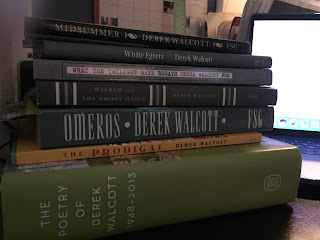On Illness, Anxiety, and Mourning
This is the end of a very long two weeks. The micro-sabbatical I'd planned for spring break did not go at all the way I'd intended, but at this point, it's difficult to care.
The Friday before the break my father went into the hospital for an infection and spent the week bouncing in and out of intensive care, since the infection severely dehydrated him, fucked up his organs, and sent his heart off-kilter.
He's okay now (fingers crossed, knock wood, god-willing, whatever), but I spent most of the recess close to my phone, twitching, not wanting to bother my mother, who sent regular updates but was overwhelmed with a host of responsibilities once my dad fell ill. I tried not to be overly dramatic or pessimistic, but for a while, without a lot of information or even the possibility of traveling south (because no one who arrives with three kids, which I would have to do, is helpful to someone in intensive care OR the person looking after him), I imagined the worst and vacillated between frantic busyness (hey guys! I have a writing desk once more!) and that stasis where you kind of pace or stand in one place and fixate on some focal point in the distance while your mind is a whorl of worry and dark thoughts and panic.
 |
| Midsummer & White Egrets: Not as fashionable, but my favorites. |
Then, at the end of the week, death twofold. Not my father (again, he's okay), but one of my professors and mentors from NYU, Derek Walcott, who was not only the teacher and poet who had the most influence over my development as a writer during (and since) graduate school, but is also, by grace of his kindness, empathy, and encouragement, probably the reason I'm still writing anything at all. Also, my husband's great aunt, one of a trio of Norwegian sisters who emigrated here in the last century and who have been the matriarchs of a large, complex family that stretches up and down the Eastern seaboard and beyond.
 |
| This poem. This book! (From Midsummer) |
So the weekend was filled with a different kind of worry, or rather, preoccupation: with those most affected by these deaths: in particular those who knew Walcott far better and more intimately than myself, and who lost not only a mentor but someone like a father, like a family member, and with my husband, who lost his aunt but is now having to reconcile himself to the great changes in his grandmother -- she didn't recognize him at first at the wake, and that was painful.
He used to visit her every day while growing up -- she lived across the road, in a house she and her husband built on land gifted from her father (he won the street in a hand of poker -- that's a kind of tale particular to the 20th century and centuries previous, one that I fear is disappearing, and will never return . . . so, another thing to mourn). His aunt lived next door to her sister, and the two were regular fixtures in his childhood and adolescence. It's been difficult for A. to get his head around this loss; not that it was a surprise (neither, actually, was W.'s, since he'd been ill for quite some time), but his grief is a surprise to him, I think. Much like my dad was surprised when my mother insisted he go to the ER. Why do we all think we should withstand so much pain, physical and emotional? Why do we imagine we must be so stoic, so strong, so resilient? What do we lose if we're not? (How much do we lose when we are?)
 |
| My writing desk. Crowded, but decluttered. |
I was NOT stoic, strong, or resilient over spring break and neither was I any of those things this week. Originally, I was supposed to write during all of the spring recess and then spend the weekend catching up on grading. But I didn't do my writing projects and I didn't do any of my grading, and the
grading was the thing that fucked me up for this week. I've spent most
of it explaining to students why I don't have all of their
long-overdue assignments graded, and then attempting to grade any
essential pieces that they needed in order for, you know, learning and
course curriculum to actually occur as planned.
And then, of course, the students showed up to class just as unprepared, if not more so. We're a sorry, sorry bunch.
It's been consuming, this kind of anxiety of the past two weeks, and while I'm certainly okay and very lucky to have my father in (relatively) good health now, and while there's nothing materially or tangibly wrong with my life at the moment, everything feels skewed. I feel alternately overwhelmed by all of the tasks I've ignored in the face of grief and anxiety, and then restless and completely ambivalent about it all -- like it's a bunch of silly nonsense anyway. My hope for this weekend is to restore a little bit of habit, a little bit of routine, to make life feel less tweaked.
And I'll do some reading. Revisiting Walcott's work seems appropriate for tomorrow, considering it's the day he'll be buried on St. Lucia, in a state funeral -- the pomp and circumstance of which is marvelous and appropriate and also terribly sad. He's gone.
His gift was far from withered, but I've always loved these lines from poem/strophe 32 in White Egrets, where Walcott responds to criticism about his work, about his reputation:
If it is truethat my gift has withered, that there's little left of it,if this man is right then there's nothing else to dobut abandon poetry like a woman because you love itand would not see her hurt, least of all by me;so walk to the cliff's edge and soar above it,the jealousy, the spite, the nastiness, with the graceof a frigate over Barrel of Beef, its rock;be grateful that you wrote well in this place,let the torn poems sail from you like a flockof white egrets in a long last sigh of release.


Comments